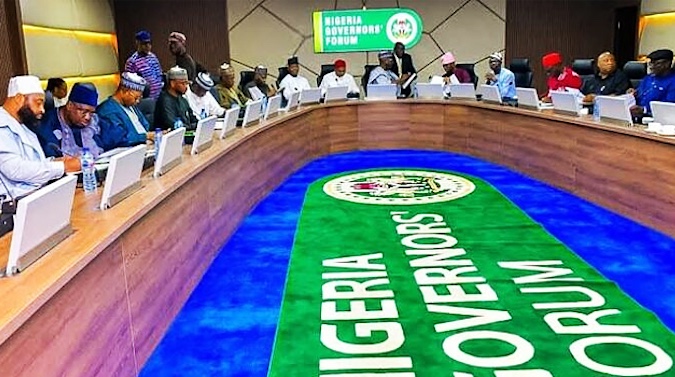The federal government’s proposal of a N62,000 monthly minimum wage continues to face strong opposition from state governors under the Nigeria Governors Forum (NGF). At a recent meeting of the minimum wage committee, governors reiterated their stance, emphasizing the severe financial consequences that could result from enforcing this wage across all states.
A source from the meeting disclosed to THISDAY that the governors warned of potential retrenchment of about 40% of state workers if forced to adopt the proposed wage. The source explained that many states are already burdened with significant debt from previous administrations and cannot afford the increased wage. Only ten states—Lagos, Delta, Akwa Ibom, Bayelsa, Cross River, Rivers, Ogun, Kano, and Kaduna—are reportedly capable of meeting the new minimum wage without compromising their fiscal stability and development plans.
“Kano State is listed among those that can pay the new minimum wage because it does not have a significant debt burden. This situation is similar across other states,” the source said. “In some states, you find over 24 drivers assigned to just four or five vehicles. What should these state governments do? Sack them? If forced to pay the new wage, states might have no choice but to retrench up to 40% of their workforce.”
The governors argue that Nigeria’s federal system should allow states to set wages based on their financial capabilities, much like the United States, where the salaries of governors vary significantly between states.
The recent tripartite meeting also highlighted ongoing concerns about oil revenue and state finances. Trade Union Congress (TUC) President Festus Osifo, from the oil sector, was challenged to explain efforts to combat oil theft and militancy, which have impacted state revenues.
Additionally, a dispute arose regarding Anambra State’s compliance with the 2019 Minimum Wage Act. While Governor Chukwuma Soludo asserted that Anambra had been paying the minimum wage, unions argued that the state had not been paying the consequential adjustments mandated by the Act. Soludo contended that the 2019 Act did not explicitly include provisions for such adjustments.
The NGF has consistently maintained that the proposed N62,000 minimum wage is unsustainable. Acting Director of Media and Public Affairs Hajiya Halimah Ahmed stated that the NGF urges all parties to consider the broader implications of the wage increase, including its impact on pensioners and other sectors.
“Any agreement to be signed should be sustainable and realistic,” Ahmed said. “The N62,000 minimum wage proposal is not sustainable and cannot fly. Many states will end up spending all their allocations on salaries with nothing left for development. Some might even need to borrow monthly to pay workers, which is not in the collective interest of the country, including the workers.”
The NGF calls for a balanced approach that considers all socioeconomic variables to reach an agreement that is fair and sustainable for all stakeholders.
